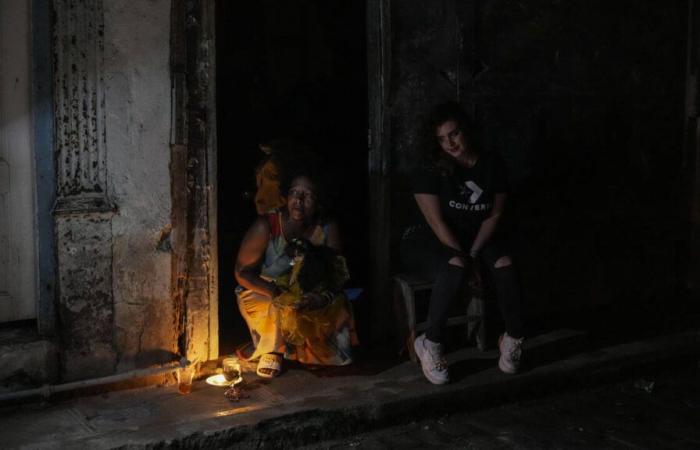While the island saw historic protests in 2021 following power outages, President Miguel Díaz-Canel has already warned that the government will not tolerate any disturbance of public order.
Dressed in a military uniform, he affirmed, during a meeting broadcast by the television news, that residents had gone out on Saturday evening to try to “cause disturbances to public order”. All perpetrators of unrest will be prosecuted “with the severity that revolutionary laws provide,” he insisted.
A complete shutdown of the electricity network after Oscar
Hurricane Oscar made landfall on Sunday in eastern Cuba, with winds approaching 130 km/h, the US Hurricane Center (NHC) announced. “Hurricane Oscar made landfall near Baracao,” at the far eastern tip of the island, the Cuban Meteorological Institute (Insmet) confirmed on its Facebook page. “The Pointe Maisi weather station reports sustained winds of 80 km/h and a gust of 116 km/h at 5:25 p.m. local time (11:25 p.m. in Switzerland).”
Oscar hits Cuba in the midst of an energy crisis as the island prepares to spend a third night without power due to an outage on Friday at the main thermoelectric plant in the west of the country that brought the grid to a complete halt .
The authorities in the east of the island “are already working hard to protect the population and economic resources, given the imminence of Hurricane Oscar,” assured President Miguel Diaz-Canel in a message published Saturday evening on X.
The government hopes to restore electricity Monday evening. “We can talk about the fact that between tomorrow Monday morning, afternoon, or evening,” service will be restored for the majority of Cubans, indicated the Minister of Energy and Mines, Vicente de la O Levy.
A few hundred thousand Cubans were able to benefit from a few hours of electricity on Sunday, before the entire electrical system was paralyzed again, according to the national electricity company (UNE). “A new disconnection from the national electricity system (SEN) has occurred. Restoration work will resume immediately,” the Ministry of Energy and Mines indicated on X on Sunday late afternoon.
Exasperation of the Cubans
Thursday, on the eve of the general blackout, the Cuban president announced that the island was in a situation of “energy emergency” faced with difficulties in purchasing the fuel necessary to power its power stations, due to the strengthening of the embargo that Washington has imposed on the island since 1962.
“It’s really serious, there is no life here, this country can’t take it anymore,” laments Serguei Castillo, a 68-year-old mason. “For two days, I have only been eating kibble, pizza and other junk,” he told AFP, angrily.
“If your electricity is cut for four or five hours, it’s still okay, but now… It’s a lack of respect for the people. I have no other way to describe what is happening to us,” says Isabel, 51, who refuses to reveal her last name. “The country paralyzed for three days is too much!”
Luis Jiménez, a 22-year-old student, also wonders about how Cubans will survive in the days to come, and about the future of his country. “If the situation is not resolved quickly, I don’t know how we will survive,” he said. “It’s really not possible anymore. It’s a country in ruins, destroyed.”
More and more frequent cuts
For three months, Cubans have suffered from power cuts that have become more and more frequent, with a national energy deficit of 30%. On Thursday, this deficit had reached 50%.
In recent weeks, in several provinces, outages have lasted more than twenty hours a day.
In Cuba, electricity is produced by eight dilapidated thermoelectric power plants, sometimes broken down or undergoing maintenance, as well as by several floating power plants rented to Turkish companies, and generators.
Power outages were one of the triggers for the historic protests of July 11, 2021.
In September 2022, the island had already experienced a widespread “blackout” after the passage of Hurricane Ian which hit the west of the island. Completely restoring electricity took several days in the capital and several weeks across the island.






